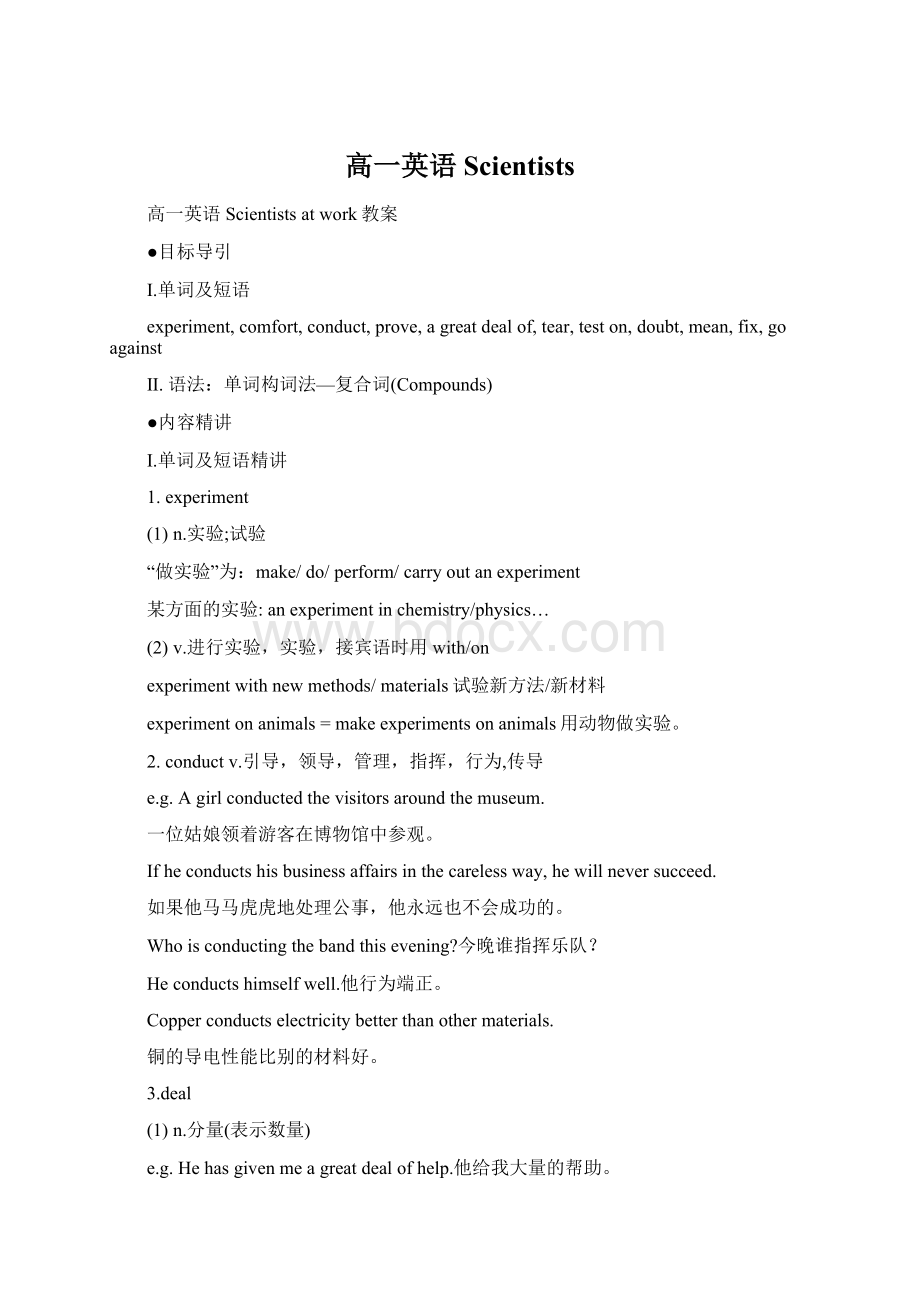 高一英语ScientistsWord文档格式.docx
高一英语ScientistsWord文档格式.docx
- 文档编号:21933698
- 上传时间:2023-02-01
- 格式:DOCX
- 页数:24
- 大小:34.76KB
高一英语ScientistsWord文档格式.docx
《高一英语ScientistsWord文档格式.docx》由会员分享,可在线阅读,更多相关《高一英语ScientistsWord文档格式.docx(24页珍藏版)》请在冰豆网上搜索。

(2)v.dealwith
a.处理
e.g.Ihavealotofletterstodealwithtoday.今天我有很多信件要处理。
Theboydealtwiththemathsprobleminadifferentway.
孩子以不同的方法处理这个数学难题。
Howdidyoudealwithmattersofthissort?
你是怎么处理这类事情的?
b.对付,和……打交道
e.g.Thatmanisimpossibletodealwith.那人是无法相处的。
Ateachershoulddealfairlywithhisstudents.
老师应公正地对待学生。
c.论述,涉及
e.g.Thesubjectisn'
tverywelldealtwithinhisbook.
这个问题在他的书里没有得到很好的论述。
4.prove
(1)vt.证明,证实,后接名词、代词、从句和复合结构
e.g.Wehaveprovedourcourageinbattle.
我们在战斗中证实了自己的勇气。
Whocanproveit?
谁能证实这一点呢?
Theywillprovethatwearetellingthetruth.
他们可以证明我们讲的是事实。
Canyouprovewhatyouweredoingat10o'
clocklastnight?
你能证明昨天晚上十点钟你在干什么?
Timewillprovemeright.时间会证明我是对的。
(2)linkv.证明,结果是,后接形容词、副词、介词短语、名词、不定式tobe
e.g.Theinstrumenthasproveduseful.这种仪器证明是有用的。
Heprovedanhonestfriend.事实证明他是个诚实的朋友。
Itwillproveoflittleuse.结果会证明它没有什么用。
Hemayprovetobethemostsuitablepersonforthejob.
他结果可能是最适合这项工作的人。
5.tearv.撕(破),扯,被撕(挂)破
e.g.Hetorethephotographintopieces.他把照片撕碎了。
Maryfelldowninthestreetandtoreherdress.
玛丽在街上摔倒了,裙子挂破了。
Thismaterialtearseasily.这种料很容易破。
Theclothesweretorn.衣服破了。
6.testvt.
(1)测验,考
e.g.Theteachertestedthestudents'
knowledgeofgrammar.
老师测验学生的语法知识。
ThestudentsweretestedontheirEnglish.学生在考英语。
(2)检验,试用,检查
e.g.Theytestedthenewplane.他们在检验新飞机。
PerhapsIneedglasses—I'
dbetterhavemyeyestested.
也许我得戴眼镜了,我得去检查一下我的眼睛。
(3)考查,考验
e.g.NowIhadtheopportunitytotestmyself.
现在我有机会来考验我自己了。
Thelongjourneytestedtheirpatience.
长途旅行考验了他们的耐性。
(4)teston在……(身上)做试验
e.g.Scientistsdecidedtotestthedrugonanimals.
科学家决定用动物做实验来检验药品。
(5)testout考验出,检验完
e.g.Hewouldnotbeabletotestouthistheories.他将无法检验他的理论。
7.doubt
(1)vt.怀疑,不相信,后接名词、代词、从句
e.g.Idoubthishonesty.我怀疑他的诚实。
I'
msorrythatIdoubtedyoubefore.对不起我曾经怀疑过你。
Idon'
tdoubtthatyouarehonest.我相信你是诚实的。
Idoubtwhetherhewillcome.我怀疑他是否会来。
(2)n.怀疑
e.g.Hehadnodoubtonthatpoint.在那一点上他毫不怀疑。
Ihavenotdoubtthatweshallbeabletodosomethingforyou.
我决不怀疑我们能为你做点什么。
Therewasnodoubtthathewasafinedoctor.
毫无疑问他是个好医生。
ThereissomedoubtwhetherJohnwillcomeontime.
不知道约翰能否按时到。
注意:
在否定句和疑问句中,doubt后的从句用that引导,在肯定句中doubt后的从句用whether/if引导(doubt是名词时,只能用whether)。
(3)beyonddoubt毫无疑问
without(a)doubt毫无疑问,一定地
indoubt怀疑,犹疑,不肯定
Ⅱ.句子精讲
8.Inmyopinion,itisawasteofmoney.在我看来,这是浪费金钱。
(1)inone'
sopinion=intheopinionofsb.在某人看来
e.g.inmyopinion,在我看来
intheiropinion在他们看来
ineveryone'
sopinion在每个人看来
intheopinionofmostpeople在大多数人看来
(2)awasteof…浪费
waste在这里是不可数名词,但可以和a连用
e.g.It'
sawasteoftimetowaitanylonger.再等下去是浪费时间。
It'
sawasteofbreathtotalktohim.和他交谈是白费口舌。
sawasteoftimearguingwithhim.你和他争辩是浪费时间。
Whatawasteofenergy!
这多么浪费精力!
9.Weshouldmakemoreuseofthisnewtechnology.
我们应该更多地利用新技术。
makeuseof利用,在名词use前面可以加上不同的形容词来表示不同程度的利用。
e.g.makegooduseof合理利用,
makethebestuseof尽量利用,
makefulluseof充分利用
名词use还可组成其他词组:
e.g.beinuse在使用中beofgreatuse很有用处
gooutofuse不被使用,废弃comeintouse开始被使用
bring/put…touse加以利用fortheuseof供……使用
10.Whataretheyfamousfor?
他们靠什么出名?
befamous/known著名,为众人所知
(1)befamous/knownfor因为……成名,表示成名的原因
e.g.Switzerlandisfamous/knownforitsmountains.瑞士以它的山而闻名。
Heisfamousforhishistorystory.他因为他写的历史小说而出名。
Heisknownforhisreadinesstohelpothers.
大家都知道他总是乐于帮助别人。
(2)befamous/knownas以什么身份而成名
e.g.Heisfamousasawriterratherthanapoet.
他是作为一名作家,而不是作为一名诗人而闻名。
Sheisknownasagreatsinger.大家都知道她是个大歌星。
(3)befamous/knownto为人所知
e.g.Heisknowntoeveryoneofus.我们每人都知道他。
sknowntoallthattheydoanimportantandnecessaryjob.
大家都知道他们干的是重要的并且是必要的工作。
11.Thestringwasgettingcharged!
细线正在导电。
get在这里是代替助动词be,与过去分词连用,以强调主语的被动行为。
e.g.Theygotcaughtinthebigrainontheirwayhere.
他们来这儿的路上遇到了这场大雨。
Hegotburntwhileputtingoutthefire.在灭火时他被烧伤了。
Didhegetburntinthataccident?
他在那次事故中受伤了吗?
Thecargotstuckinthesnow.汽车陷在了雪中。
注意:
getdone有时不表示被动意思
e.g.Doyouknowshe'
sgotmarried?
你知道她已经结婚了吗?
vegotusedtosuchawayoflife.我已习惯了这样的生活方式。
Don'
tgetexcitedaboutit.别为这激动。
get还有其他用法
(1)get用作使役动词时,其宾语补足语可用多种形式,用动词的什么形式取决于该动词与宾语之间的关系。
getsth./sb.todo/doing/done/adj.
e.g.Youmustgetthemtocomeoverhereatonce.(=havethemcome)
你得想法让他们马上到这儿来。
llgetMarytodothewashingforyou.(=haveMarydo)
我来让玛丽替你洗这些衣服。
Whydon'
tyougetyourshoesmended.(=haveyourshoesmended)
你怎么不请人把鞋补一补。
llgoandgetmyhaircut.(=havemyhaircut)我要去理发。
Thenextthingistogettheproblemsettledassoonaspossible.
接下来就是尽快使问题得到解决。
Hegothislegbrokenwhileplayingfootball.踢足球时他的腿骨折了。
Canyougetthecargoingagain?
你能使汽车再次开动起来吗?
Haveyougotsupperready?
你把晚饭做好了吗?
Ican'
tgetthewindowopen.这窗户我打不开。
(2)gettodo表示从没有到有的变化,指不定式动词的动作或状态的开始,这时不定式动词大多为意识性或情感性的动词,动词come可代替get,不改变这一作用。
e.g.Igottoknowhimin1998.我是1998年认识他的。
You'
llsoongettolikethework.你不久就会喜欢这份工作的。
WehavegottoseetheimportanceofstudyingEnglish.
我们开始认识到学英语的重要性。
12.Flythekitewhenathunderstormappearstobecomingon.
当雷雨好像就要来的时候放飞风筝。
comeon在这里表示“开始(……起来),袭来……”。
e.g.Itcameondark.天黑了。
Raincameon/itcameontorainjustbeforedaybreak.天快亮时开始下起雨来。
Hefeltacoldcomingon.他觉得有点感冒了。
comeon有其他含义:
(1)跟着来
e.g.Yougofirst.I'
llcomeonimmediately.你先走,我马上跟来。
(2)进步,进展,成长
e.g.Thecorniscomingonsplendidly.玉米长势好极了。
Howisyourworkcomingon?
你的工作情况如何?
(3)(问题、案件等)被提出来
e.g.Thecasewillsooncomeonfortrial.这案件很快就要开审。
come的其他短语
(1)comeout出现,被获知,出版,结局
e.g.Thestarscomeout(=appeared)assoonasitisdark.
天一黑星星就出来了。
Howdidtheprintingcomeout(=appear)?
这种印刷是如何出现的?
Thenewscameout(=becameknown)yesterday.
这个消息是昨天传出来的。
Thetruthfinallycameout(=becameknown).真相终于大白。
Whenwillyourbookcomeout(=bepublished).你的书何时出版?
Howdidtheballgamecomeout(=end)?
这场球赛的结局如何?
(2)comeabout发生
e.g.Howdidallthiscomeabout(=happen/takeplace)?
所有的这一切是怎样发生的?
Itcameout(=happened)inthisway.这事就是这样发生的。
(3)comeback恢复,重现于记忆中。
e.g.Theyaskedmetoresttillmyhealthcameback.
他们要我一直休息到健康恢复为止。
Theirnamesareallcomingbacktomenow.
他们的名字,我现在渐渐地都想起来了。
(4)comeup走近,发芽,被提出
e.g.Christmasiscomingupsoon.圣诞节快到了。
Theseedshaven'
tcomeupyet.种子还没有发芽。
Thequestionwillcomeuptomorrow.这个问题将于明天被提出来讨论。
13.…butanimalrightsactivistssaythatitdoesnotwork.
但是动物权力活动家们说这不起作用。
workv.有效、灵验、行得通、运转、开动,这时主语是非生物类名词。
sagoodidea,butitwon'
twork.这是个好主意,但就是行不通。
Theplanworkedsmoothly.这个办法很能解决问题。
Themedicinewillnotwork.这药不灵。
Theclockhasn'
tbeenworkingsincethismorning.
这只钟从今天早上起就不转了。
Yes,themethodmightwork.是的,此法可能行得通。
Ⅲ.语法精讲
14.单词构词法——复合词(Compounds)
(1)复合词分为
名词复合词
e.g.day+break—daybreak(n.+n.)拂晓,破晓,黎明
play+house—playhouse(v.+n.)戏院
hair+cut—haircut(n.+v.)理发,做头发,发型,发式
wind+mill—windmill(n.+n.)风车
动词复合词
e.g.brain+wash—brainwash(n.+v.)洗脑
baby+sit—babysit(n.+v.)临时受雇照料婴儿
形容词复合词
e.g.man+eating—maneating(n.+v.ing)食人的
heart+broken—heartbroken(n.+v.ed)使人伤心的
duty+free—dutyfree(n.+adj.)免关税的
介词复合词
e.g.in+to—into进入
through+out—throughout遍及
(2)复合名词(compoundnoun):
两个名词用在一起表达意思
a.两个名词联合在一起,中间无连字符“-”
e.g.headache头痛newspaper报纸railway铁轨timetable时间表
b.两个名词中间由连字符号“-”连起来
e.g.mouse-trap捕鼠器tooth-brush牙刷man-servant男仆
traffic-light红绿灯
c.两个名词分开,无连字符号“-”
e.g.flowershop花店policestation警察局goodstrain货车
washingmachine洗衣机
d.一个可数名词加上一个副词或介词,中间有连字符号“-”
e.g.looker-on旁观者passer-by过路人
e.一个动词加上一个副词或介词,中间有连字符号“-”
e.g.close-up(电影等的)特写镜头sit-in(室内)静坐抗议
一般而言,复合词中右边的成分不仅决定整个复合词的范畴,而且同样也决定复合词的主要意义。
从这个意义上讲,右边的成分充当了核心词。
●迁移发散
15.meanv.
(1)meantodo意欲,打算做
e.g.I'
msorryifmywordshurtyou,Ididn'
tmeanto.
如果我的话伤了你,请你原谅,我是无意的。
Doyoumeantostartanargument?
你是想辩论吗?
(2)meandoing意思是,意味着
e.g.Whathesaidmeanthiringmoreworkers.他的意思是再雇一些工人。
(3)meansb.todosth.要某人做某事
e.g.Theteacherdidn'
tmeanyoutocomesoearly.老师并不是要你来这么早。
meansn.手段,方法,单复数相同
e.g.Everymeanshasbeentried.
=Allofthemeanshavebeentried.所有的/每个方法都尝试了。
[过关题]
(1)Everypossiblemeans__________topreventtheairpollution,buttheskyisstillnotclear.
A.isusedB.areused
C.hasbeenusedD.havebeenused
答案:
C
(2)—Whyhaven'
tyouboughtanybutter?
—I__________tobutIforgotaboutit.
A.likedB.wished
C.meantD.expected
(3)—Youshouldhavethankedherbeforeyouleft.
—Imeant__________,butwhenIwasleavingIcouldn'
tfindheranywhere.
A.todoB.to
C.doingD.doingso
B
(4)InsomepartsofLondon,missingabusmeans__________foranotherhour.
A.waitingB.towait
C.waitD.tobewaiting
A
16.表示数量“大量”短语
修饰可数名词:
alargenumberof,agreat/goodmany,quiteafew
修饰不可数名词:
agreat
- 配套讲稿:
如PPT文件的首页显示word图标,表示该PPT已包含配套word讲稿。双击word图标可打开word文档。
- 特殊限制:
部分文档作品中含有的国旗、国徽等图片,仅作为作品整体效果示例展示,禁止商用。设计者仅对作品中独创性部分享有著作权。
- 关 键 词:
- 英语 Scientists
 冰豆网所有资源均是用户自行上传分享,仅供网友学习交流,未经上传用户书面授权,请勿作他用。
冰豆网所有资源均是用户自行上传分享,仅供网友学习交流,未经上传用户书面授权,请勿作他用。


 广东省普通高中学业水平考试数学科考试大纲Word文档下载推荐.docx
广东省普通高中学业水平考试数学科考试大纲Word文档下载推荐.docx
